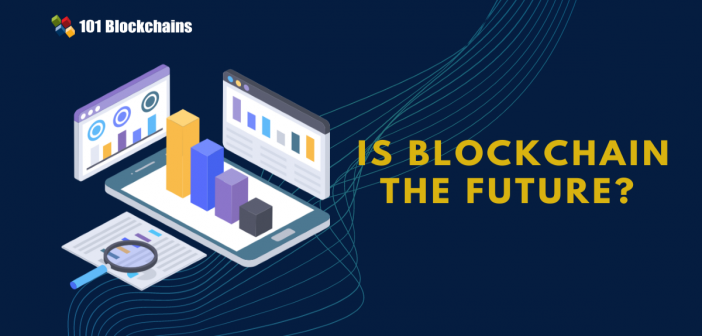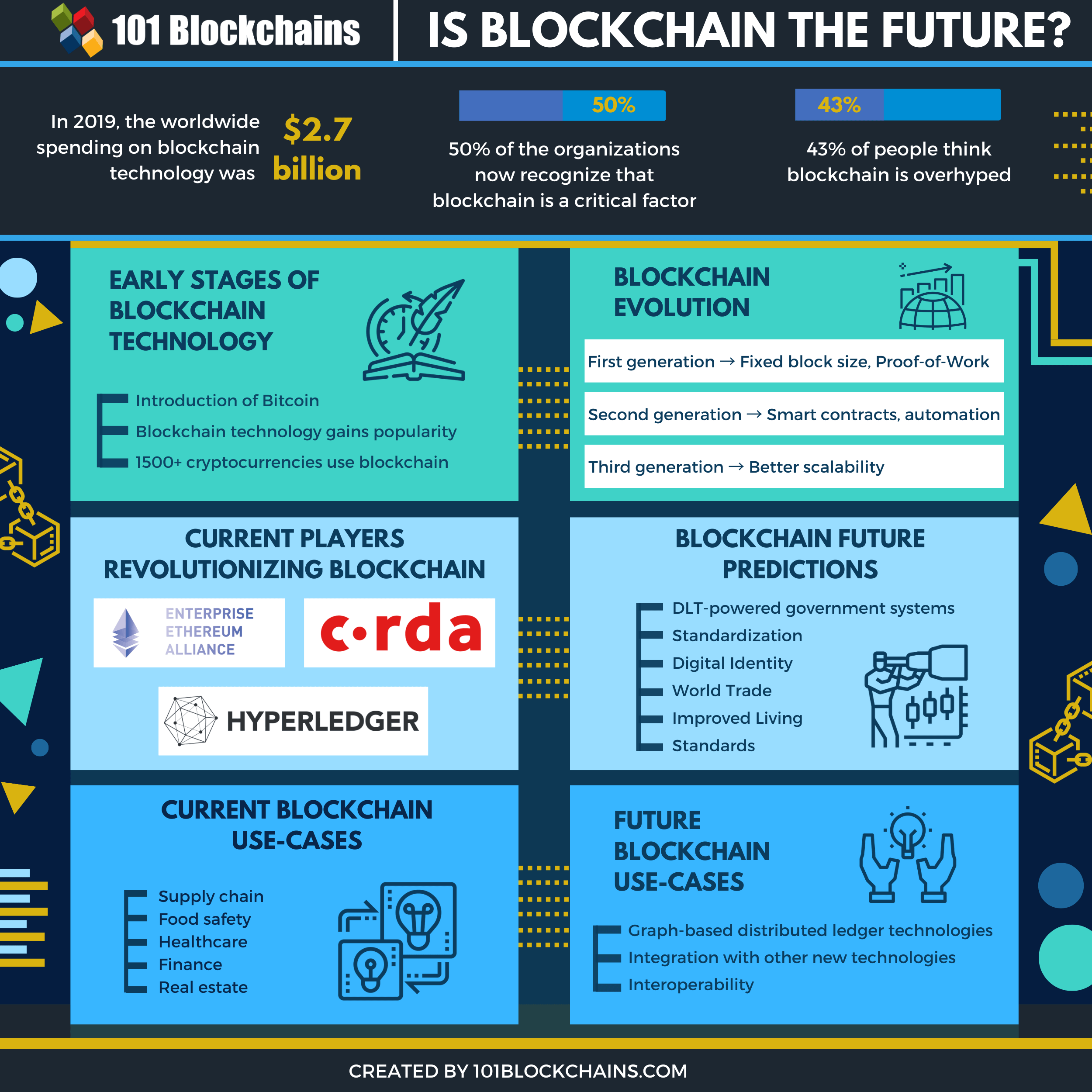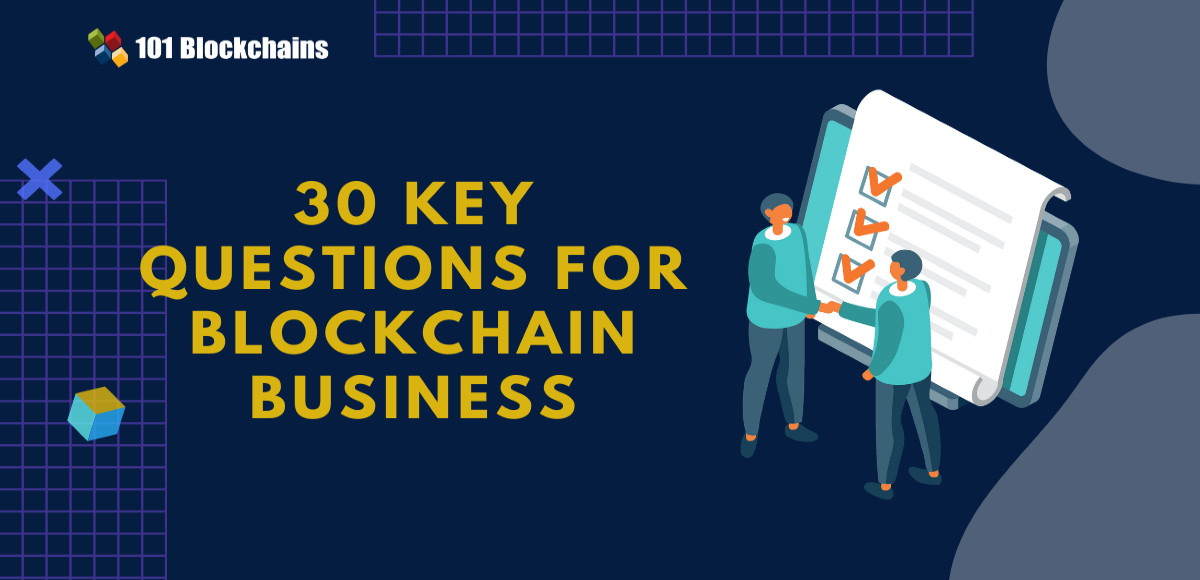Learn how blockchain truly works, master key definitions, and uncover what makes smart contracts so "smart." Dive into the fundamentals, gain valuable insights, and start your blockchain journey today!

- Opinions
101 Blockchains
- on March 08, 2021
Is Blockchain The Future?
In this article, we will see if blockchain holds the promise to change our future or not.
Have you ever thought about “is blockchain the future”? If you did, then you are not alone. Blockchain technology has taken everyone as a surprise as it has the potential to change almost everything around us.
We live in an era where technology plays a crucial role in our day-to-day activity. For instance, you check the internet, connect to online stores to buy groceries, and watch your favorite show on Netflix. All of these are not possible without the inclusion of technology.
In this article, we will see if blockchain technology holds the promise to change our future or not. To ensure that we do it correctly, we will look at the blockchain companies, blockchain future trends, and more! Also, will future blockchain companies will be able to capture the trend and make the most out of it?
Build your identity as a certified blockchain expert with 101 Blockchains’ Blockchain Certifications designed to provide enhanced career prospects.
Blockchain Features
To get a better understanding of blockchain’s future, we need to first go through its features.
Blockchain is a peer-to-peer network that relies on a decentralized approach. The absence of a centralized entity opens up a plethora of options for organizations that need trust, immutability, and transparency. To get a better idea, think of a big chain. If one of the chain’s small units is removed, the chain breaks, alerting everyone that something is wrong. Blockchain depends on a consensus method to verify and write transactions on the blockchain.
To better understand what blockchain has to offer, let’s go through the key features below.
Please include attribution to 101blockchains.com with this graphic. <a href='https://101blockchains.com/blockchain-infographics/'> <img src='https://101blockchains.com/wp-content/uploads/2020/03/Is-Blockchain-The-Future.png' alt='Is Blockchain The Future='0' /> </a>
Decentralized Technology
One of the biggest features of blockchain is its decentralized technology. By virtue of decentralization, there is no need for a governing body. The nodes work together to validate a transaction using the consensus method(s).
This way, a blockchain network can be used to store documents, valuable digital assets, cryptocurrencies, and more. As a user, all you need to do is make sure that you take proper care of your private keys — through which you can get access to your belongings on the assets online.
Better Security
Blockchain security is really top-notch. Blockchain also offers better security with the help of the cryptography used in making sure the data is secure. It’s a decentralized approach also means that the platform or network cannot be shut down or modified by just one single entity. Even the highest secure, centralized entity can be hacked, making blockchain a very good security system as it doesn’t require a centralized approach.
Immutability
The data stored in the blockchain are immutable in nature. This means that the data, once saved, cannot be changed or altered. The immutability gives blockchain a great way to be part of systems where data theft or alterations are common occurrences.
Faster Settlements
Blockchain offers faster settlement options when it comes to banking. The current banking system is too slow and takes a lot of time when it comes to settlements. With blockchain, the settlements will be almost instant, with no delays whatsoever.
Start your blockchain journey Now with the Enterprise Blockchains Fundamentals
Blockchain Evolution
To better understand what blockchain currently is, we need to take a look at the history of blockchain technology and learn about the three generations.
-
First-generation:
The first generation of blockchain technology revolved around bitcoin and digital currencies. They were basic in nature and did not provide a way to automate tasks around it. Also, there was only one kind of blockchain that revolves around blocks. The bitcoin utilizes 1 MB of block size to store transactions. At that time, the block size might be enough, but now it seems to be on the small side. Also, storing every transaction information within the block was not ideal as it made fewer transactions fit in the block.
However, it was revolutionary. It introduced the idea of distributed ledger technology, and now teams are working towards making it better with each passing day.
-
Second Generation:
The second generation of blockchain technology introduced a new concept, known as smart contracts. It made blockchain more versatile. With smart contracts, blockchain can now not only store information but also automate agreements on blockchain. Ethereum was the first blockchain that truly introduced the concept of smart contracts. It also started the blockchain technology second generation.
You can think of smart contracts as legal documents on code. They are executed if certain conditions are met, just like how a legal document works in real life.
-
Third generation:
We are yet to see the third generation of blockchain technology. However, we are in the state of transition from the second to the third generation. Right now, the biggest bottleneck that blockchain suffers from is scalability. The transactions are queued, and it can take anywhere between a couple of hours to days for some transactions to get completed. Many other distributed ledger technologies have solved it, but not at par with centralized solutions, including VISA.
Not sure how to build your career in enterprise blockchains? Enroll Now in How to Build Your Career in Enterprise Blockchains Course
Current Uses Cases and Future Use-Cases
To get a better understanding of blockchain, we also need to take a look at the different enterprise blockchain use cases.
Current Blockchain Use-Cases
There are many blockchain usage right now. Let’s list them below.
-
Supply Chain:
The current generation supply chain is efficient but suffers from many problems, including lack of transparency, traceability, and traceability. With blockchain, all of these are going to change. Blockchain for the supply chain offers transparency and, in return, ensures that each item can be traced without full transparency.
Excited to learn about the supply chain in blockchain? Enroll now in Enterprise Blockchains and Supply Chain Management Course
-
Food safety:
One of the most notable use-cases of blockchain includes Food safety. IBM, in collaboration with Walmart, is utilizing blockchain technology to improve food safety. With every single information of food during its transition time, the food will always reach safely to the end consumer. The manufacturers only need to make sure that they put a barcode on each food item so that it can be tracked through blockchain.
-
HealthCare:
The current state of healthcare has been improved by blockchain. It helps digitize patient profiles, which removes the errors and inaccuracies that came with documentation. In short, it improves electronic health records(EHRs).
This way, patients also do not have to worry about carrying their reports with them. Apart from EHRs improvement, drug traceability will also improve. With blockchain for healthcare, the drugs can be traced along throughout their journey, ensuring that no counterfeit drug reaches the end-users. The other key improvements include patient consent management, incentivization through micropayments, and data security in clinical trials.
-
Finance:
The finance sector is the biggest sector that has been impacted by blockchain. For instance, it has improved security, transparency, trust, privacy, scalability, programmability, and the finance sector’s performance. It is easy to understand that the financial transactions are now streamlined and programmable thanks to the use of second-generation blockchain solutions such as Ethereum. It also makes sure the authenticity of data.
-
Real estate:
Real estate will improve the real estate market drastically. Blockchain for real estate can benefit it by reducing costs, automating processes, tokenization, real-time payment settlements, better data accessibility, and network transparency.
Want to learn about the intersection of blockchain and real estate? Enroll Now in Blockchain For Real Estate Masterclass
Future Blockchain Use-Cases
The future of blockchain does seem bright. In the future, we can see blockchain being integrated into almost everything around us, including artificial intelligence (AI) and the internet-of-things. Even though it might seem that blockchain use-cases are plentiful, it is hard to say that they are exhausted. Blockchain is an emerging technology with a lot of things that can be improved in the near future. With innovations such as graph-based distributed ledger technology, it is important to understand that there are a lot of things to come for blockchain or DLT, in general.
In the future, we can easily see blockchain being integrated with smart cars, the internet, and almost everything we do and experience.
Current Players Revolutionizing Blockchain
In this section, we will briefly take a look at the current players revolutionizing blockchain.
-
Hyperledger
Hyperledger is an open-source blockchain project that is managed by The Linux Foundation. It is an umbrella project which consists of multiple projects, including distributed ledgers, libraries, tools, and domain-specific projects. The Hyperledger blockchain greenhouse is big and consists of amazing projects, including the well-known Hyperledger Fabric, Hyperledger Besu, and others.
More than 300+ companies are participating in Hyperledger projects, including premier members such as IBM, Intel, SAP, and others.
Want to learn the basic and advanced concepts of Blockchain and Hyperledger Fabric? Enroll now in Getting Started with Hyperledger Fabric Course
-
DAML
DAML is another interesting project that aims to provide a unified programming language to write distributed apps. It lets developers be productive and innovative. It is an open-source programming language and is currently being used by many platforms, including Sextant, Hyperledger Sawtooth, Amazon Aurora, Hyperledger Fabric, and so on.
-
Corda
Corda is an open-source blockchain platform aimed at businesses. It offers a global blockchain ecosystem that brings in developers to improve the blockchain state across industries. With Corda, businesses can implement their own distributed ledger that improves businesses. It also offers strict privacy with the help of smart contracts.
-
Ethereum Enterprises
The last blockchain project that we are going to discuss includes Ethereum Enterprise. It is an enterprise version of the public Ethereum that is aimed at enterprise use. They are working hard to create a standards organization that can work on blockchain specifications for worldwide business and consumer implementation.
Excited to learn the basic and advanced concepts of ethereum technology? Enroll Now in The Complete Ethereum Technology Course
What Is the Future of Blockchain?
There is no doubt that blockchain is not a Fad anymore. Its usefulness can easily be gauged from its use-cases itself. Many businesses have already implemented blockchain in their processes. And many other businesses want to implement blockchain.
However, blockchain is not the one-solution that every company is looking for. As a business, you need to make sure that you evaluate the parameters correctly before implementing blockchain.
Also, we already know that blockchain is going to change the world.
With almost a decade over, we have seen decent growth with blockchain. Its implementation rates have gone high, and some projects are trying to standardize blockchain for enterprise, i.e., Hyperledger. The open-source nature of blockchain also improves its chance to grow beyond what we expect from such a new technology.
Blockchain is currently being used in vital processes, including cross-border payments, supply chain, identity, and so on, making it more than ready for future-implementation. However, it is hard to say how the impact will be and whether it will be really impactful in different verticals and solutions.
Blockchain Future Predictions
So, what can we expect from blockchain in the future? Let’s see some of the future predictions for blockchain. These are the future trends of blockchain technology.
-
DLT-powered Government Systems:
Governments are keener to implement their processes in DLT as it gives them more freedom to experiment and stay transparent. One such government is the Dubai government that wants to become the first government to run every government system on the blockchain. Other governments are also keen on making the most out of the blockchain as they look for ways to integrate it into their current systems. So, blockchain for government is going to be a thing of the future.
-
Standardization:
Blockchain is evolving at a rapid pace, and that’s what makes it so amazing! With more time, blockchain will become standardized. This will make it easy for anyone to implement blockchain and collaborate towards the improvement of DLT.
-
Digital Identity:
Blockchain has the ability to offer a DLT-based, cross-border identity standard for all the citizens of the world. It will not only digitize the identity of an individual but also make it possible to digitize assets. So, blockchain for digital identity will also be a prominent sector in the future.
Want to understand the concept of decentralized identity? Enroll now in the Decentralized Identity Fundamentals Course!
-
World Trade:
In the future, we can see blockchain become the backbone for running world trade. Blockchain for trade finance offers all the promising features that make it possible for different parties to trust each other. We already know how it improves supply chain and logistics. With this, it will be possible for anyone to do trade through blockchain as every action is transparent and immutable. This is also going to be the future trends of blockchain technology.
Excited to learn fundamentals of trade finance and existing processes? Enroll Now in Enterprise Blockchains And Trade Finance Course
-
Improved living standards:
With everything improving in terms of transparency, trust, immutability, security, and scalability — it is only time when blockchain technology will improve living standards.
Conclusion
This leads us to the end of our article, where we discussed blockchain is the future. As we looked through the various stages of blockchain and learned about the capabilities, it holds we can safely say yes, blockchain is the future.
We also pointed out some possible future predictions that you should check out to get an idea about what could happen in the future. If you are intrigued by blockchain technology, then we recommend starting with our Enterprise Blockchains Fundamentals Course.
*Disclaimer: The article should not be taken as, and is not intended to provide any investment advice. Claims made in this article do not constitute investment advice and should not be taken as such. 101 Blockchains shall not be responsible for any loss sustained by any person who relies on this article. Do your own research!





![Future of Blockchain: Predictions for 2022 [UPDATED] future of blockchain predictions](https://101blockchains.com/wp-content/uploads/2020/12/future-of-blockchain-predictions.png)

